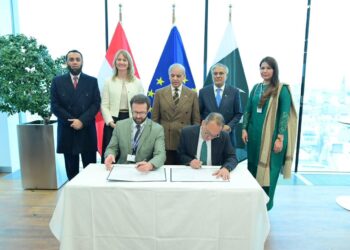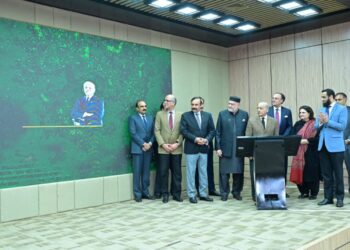In a significant development for Pakistan’s economy, Finance Minister Muhammad Aurangzeb announced that interest rates have decreased substantially, and there is still room for further reductions. Speaking at a news conference in Islamabad, the Finance Minister highlighted a series of economic improvements, emphasizing the restoration of investor confidence, growth in exports, and progress in structural reforms under the International Monetary Fund (IMF) program.
Economic Stability and Development
Addressing the media, Finance Minister Aurangzeb stated that Pakistan has entered a phase of economic stability, which is a crucial prerequisite for sustainable development. “Economic stability has returned to the country, and now our focus is on maintaining and enhancing it for long-term growth,” he said. The minister noted that the macroeconomic indicators are pointing toward a healthier economic environment.
Improvement in External Economic Indicators
Aurangzeb shared that the external front of the economy has shown notable improvements. One key highlight was the expected rise in remittances, which are projected to exceed $36 billion this year. This surge in foreign inflows is contributing to a more stable balance of payments and strengthening foreign exchange reserves.
He further mentioned that the country’s foreign exchange reserves are expected to reach $13 billion by the end of June. This projection reflects strong inflows and better fiscal management, both of which are helping to stabilize the national currency and improve investor sentiment.
No Issues in Opening LCs and Profit Repatriation
The Finance Minister reassured the business community by stating that there are currently no issues in opening Letters of Credit (LCs) and in the repatriation of profits by foreign companies. This indicates a normalization of financial operations, which had previously been disrupted by macroeconomic instability and foreign exchange constraints.
Record Reduction in Inflation
On the domestic front, Muhammad Aurangzeb emphasized a significant reduction in inflation. He urged that this reduction should translate into real benefits for the general public. “The Economic Coordination Committee (ECC) of the Cabinet is actively monitoring inflation and implementing measures to curb it further,” he added. The ECC has introduced new protocols to ensure the monitoring and mitigation of inflationary pressures across sectors.
Interest Rates and Investor Confidence
Highlighting the monetary policy, the Finance Minister confirmed that there has been a notable decrease in interest rates. “We have already seen a significant drop, and I believe there is still room for further reduction,” he said. Lower interest rates are expected to spur borrowing, boost business activity, and support economic growth.
Investor sentiment is showing signs of recovery, as confirmed by reports from PricewaterhouseCoopers (PwC) and the Overseas Investors Chamber of Commerce and Industry (OICCI), which indicate an increase in business confidence. Local investors are returning to the market, and investment in the Pakistan Stock Exchange has increased notably.
Economic Activity and Consumer Spending
Providing examples of growing economic activity, the Finance Minister highlighted consumer spending data. During Eid-ul-Fitr, purchases totaled Rs. 870 billion, a significant increase from Rs. 720 billion spent during the same period last year. Similarly, the first half of the fiscal year saw a 14% rise in cement production, a 40% increase in car sales, and a 30% rise in motorcycle sales. These figures indicate a rebound in consumer confidence and overall market activity.
Progress with IMF Structural Reforms
Aurangzeb announced that Pakistan has successfully reached a staff-level agreement with the IMF. More importantly, the country has achieved the structural benchmarks set by the IMF, a milestone that Pakistan had previously struggled to meet. “This is the first time that we have successfully met the IMF’s structural requirements,” he stated.
He noted that for the first time, provincial governments have also contributed to achieving fiscal targets. This coordinated effort across federal and provincial levels has laid the foundation for further cooperation under the upcoming Extended Fund Facility (EFF) with the IMF.
Climate Finance and Tranche Disbursement
In addition to macroeconomic goals, Pakistan has reached an agreement with the IMF on climate change financing. The expected $1 billion from the IMF will not be disbursed in one go but will be released in phases as Pakistan meets climate-related benchmarks. The Finance Minister emphasized that implementing structural reforms will be key to unlocking further support under the full IMF program.
Tax Collection and Digital Reforms
Aurangzeb also outlined improvements in tax collection. The tax-to-GDP ratio has increased to 10.8%, and efforts are ongoing to further broaden the tax base. The digitization of the Federal Board of Revenue (FBR) has played a significant role in enhancing efficiency.
The Track and Trace system has been fully implemented in key sectors such as sugar, fertilizer, and tobacco. However, its implementation in the cement sector remains incomplete. The government plans to expand this system to cover additional sectors, ensuring transparency and minimizing tax evasion.
Simplifying Tax for the Salaried Class
To ease the tax burden on salaried individuals, the Finance Minister announced that a simplified self-tax payment system will be introduced in the next fiscal year. This initiative aims to streamline tax compliance for the salaried class and improve voluntary tax payments.
Conclusion: Building on Stability
In conclusion, Finance Minister Muhammad Aurangzeb’s remarks highlight a turning point in Pakistan’s economic trajectory. With declining inflation, improved investor confidence, stronger foreign exchange reserves, and successful IMF cooperation, the country appears to be on a path toward long-term economic stability and sustainable growth. However, the minister emphasized that continued structural reforms and prudent fiscal management will be essential in building on these gains

























